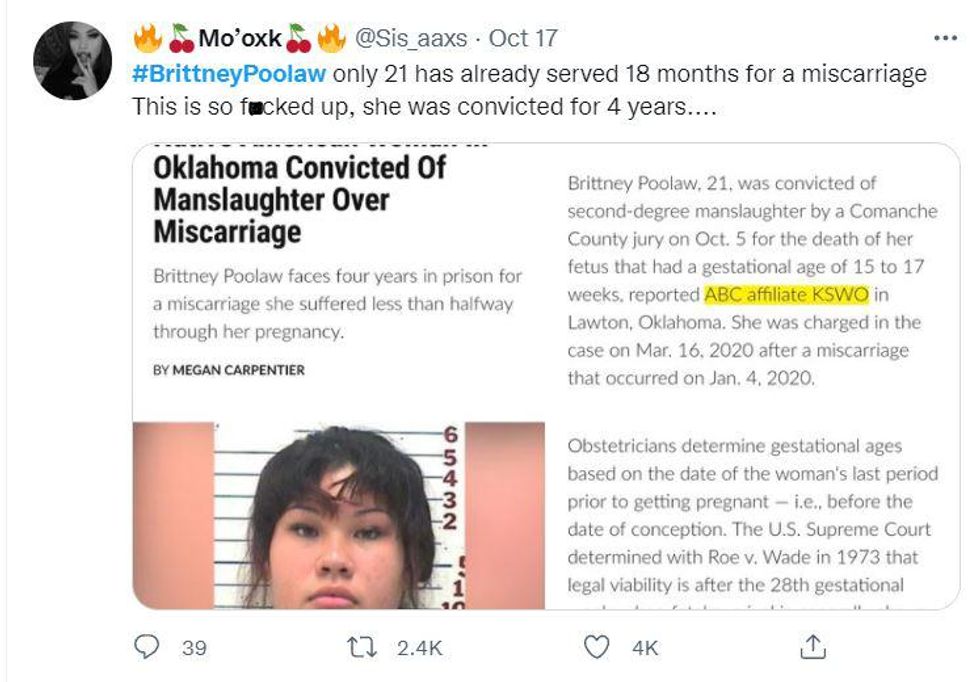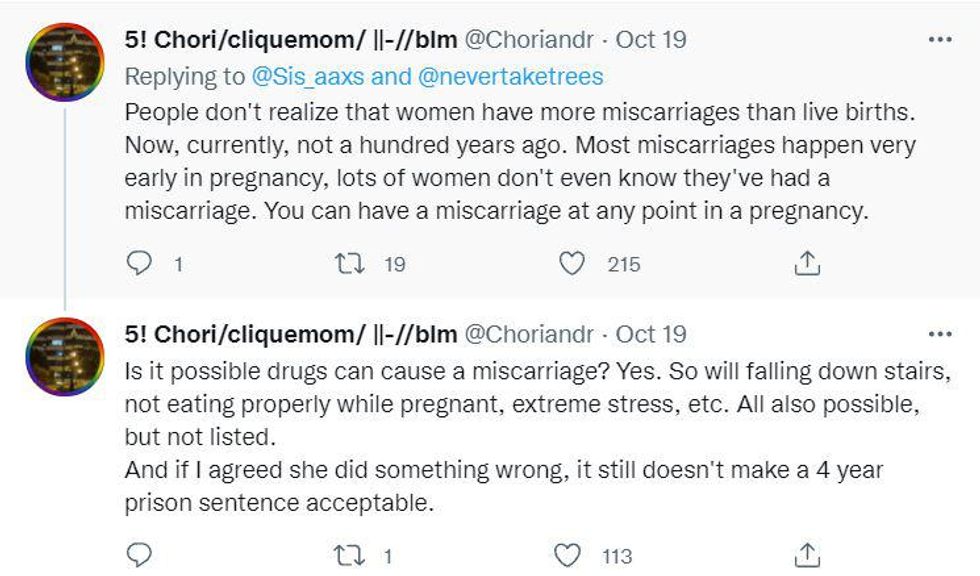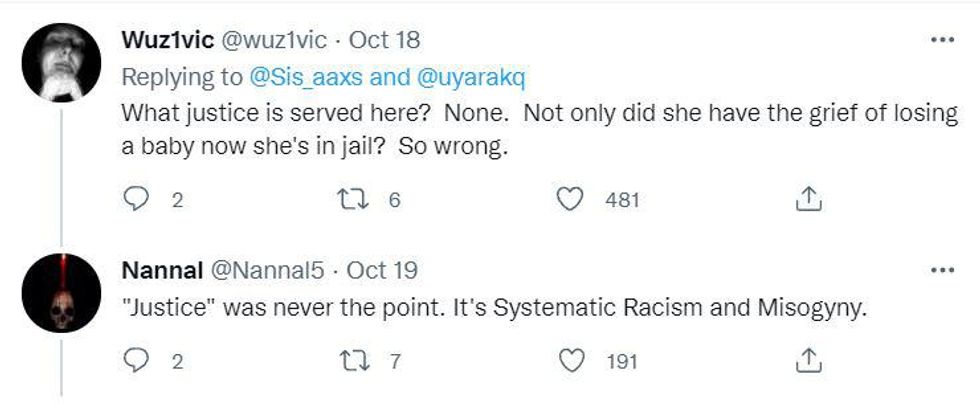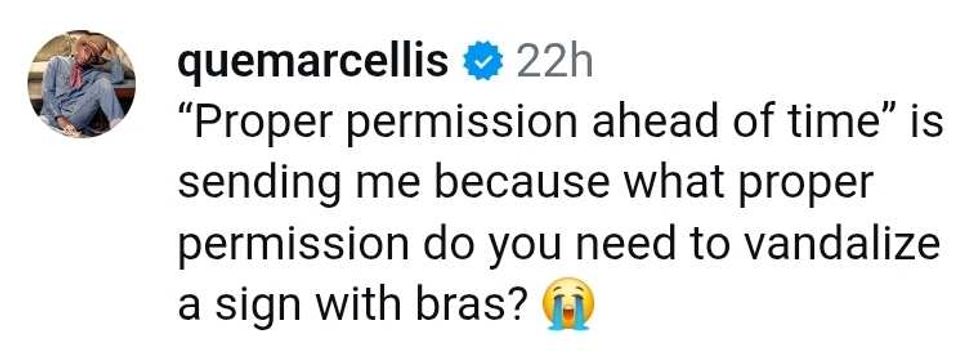Outrage from reproductive rights groups and others are flooding social media after a 21-year-old was sentenced to four years in prison after suffering a miscarriage.
Brittney Poolaw, who's from Oklahoma and a member of the Comanche Nation, had a miscarriage while using methamphetamine.
The court found her guilty of first-degree manslaughter on October 6 and her attorney filed a notice of intent to appeal on October 15.
An autopsy of the fetus was done and methamphetamine was found in the brain and liver, however that was not determined to be the cause of death.
Lynn Paltrow, executive director of the National Advocates for Pregnant Women, said the cause of death could have been a congenital abnormality and placental abruption.
Prosecutors argued that Poolaw's use of meth fell under Oklahoma's manslaughter statute.
National Advocates for Pregnant Women (NAPW) released a statement that contradicted prosecutor's claim:
"Oklahoma's murder and manslaughter laws do not apply to miscarriages, which are pregnancy losses that occur before 20 weeks, a point in pregnancy before a fetus is viable (able to survive outside of the womb)."
"And, even when applied to later losses, Oklahoma law prohibits prosecution of the 'mother of the unborn child' unless she committed 'a crime that caused the death of the unborn child.'"
USA TODAY reported that Poolaw sought medical attention when she miscarried between 15 and 17 weeks of pregnancy.
According to the American College of Obstetricians and Gynecologists, a fetus typically cannot survive outside of the womb before 24 weeks of gestation.
For people who can get pregnant under the age of 35, there's a 15% chance of a miscarriage.
Tyler Box, a partner at the Overman Legal Group in Oklahoma City unaffiliated with the case, said:
"Here, Assistant District Attorney Galbraith believed that but for Ms. Poolaw's methamphetamine consumption this unborn fetus would have been carried to term."
"The issue that jumps out to me initially is how the state was able to prove that it was in fact the meth usage that was the proximate cause of the death."
In Oklahoma, there isn't a law that makes it illegal to consume banned substances, which may assist Poolaw's appeal chances.
NAPW said:
"Ms. Poolaw's case is a tragedy."
"She has suffered the trauma of pregnancy loss, has been jailed for a year and a half during a pandemic, and was charged and convicted of a crime without basis in law or science."
Many are speaking up about Poolaw's case on social media.
Why is there ZERO MEDIA COVERAGE of Brittney Poolaw\u2019s conviction of manslaughter for having a miscarriage?!?\n\nCould it be because she\u2019s an Indigenous woman?\n\nObviously.pic.twitter.com/l0ULUmx4hA— Nahanni Fontaine (@Nahanni Fontaine) 1634695732
This needs to be boosted ASAP. #BrittneyPoolawpic.twitter.com/Hu7DkAuUuz— Lalita Lolli \u2661 NYC (@Lalita Lolli \u2661 NYC) 1634355330
Brittney Poolaw was convicted of manslaughter because she miscarried. The justice system is now criminalizing women for the inability to control nature.https://twitter.com/NahanniFontaine/status/1450645161248133123\u00a0\u2026— Survivor Extraordinaire BSW, MA (@Survivor Extraordinaire BSW, MA) 1634831803
Brittney Poolaw is a member of the Comanche Nation and was sentenced to 4 years for having a miscarriage.https://twitter.com/pph_collective/status/1450930986489982978\u00a0\u2026— UAINE (ndnviewpoint) (@UAINE (ndnviewpoint)) 1634786911




The criminalization of Brittney Poolaw for her miscarriage is cruel and horrifying.\n\nTo support Brittney, follow @NAPW for updates, actions, and other ways you can offer compassion and hope, from sending letters to financial support.https://twitter.com/NAPW/status/1450132550509342728\u00a0\u2026— If/When/How: Lawyering for Reproductive Justice (@If/When/How: Lawyering for Reproductive Justice) 1634577071
#BrittneyPoolaw was just mentioned on @MSNBC in the context of the new Texas law. Let\u2019s keep her story top of mind. Hopefully someone can intervene and file an appeal on her behalf.pic.twitter.com/N5WWjy1QTL— Oklahoma violated tribal jurisdiction for 113 yrs (@Oklahoma violated tribal jurisdiction for 113 yrs) 1634677471
Thank you @ms_creilly for covering the injustice facing #BrittneyPoolaw, sentenced to 4 years in prison for a miscarriage. We are indeed on the slippery slope and its only getting steeper.https://twitter.com/gim_esther/status/1451194547304730631\u00a0\u2026— Dana Sussman (@Dana Sussman) 1634827701
Brittney Poolaw will spend 4 years in prison for having a miscarriage. That dystopian future everyone keeps warning about is already herehttps://www.kswo.com/2021/10/05/woman-found-guilty-first-degree-manslaughter/\u00a0\u2026— Jessica Valenti (@Jessica Valenti) 1634321795
NAPW says that these cases are actually on the rise.
Rewire News Group reported:
"According to [NAPW's] analysis, from 1973 to 2005 there were at least 413 cases in which a woman's pregnancy or pregnancy outcome was a determinative factor in her loss of liberty."
"Since 2005 that number has tripled to over 1,200, indicating a rapid escalation of these types of arrests."
NAWP also tweeted:
"These cases include pregnant women who have been arrested for falling down stairs, drinking alcohol, giving birth at home, being in a 'dangerous' location, having HIV, experiencing a drug dependency problem, or attempting suicide."
"The majority of women subjected to pregnancy-based prosecutions are low-income women, drug-using women, and women of color."
The organization has shared several policy statements from health officials saying pregnant women who have drug dependencies or addictions should not be criminally penalized. They deserve care and treatment.








 @bbcradio1/TikTok
@bbcradio1/TikTok @bbcradio1/TikTok
@bbcradio1/TikTok @bbcradio1/TikTok
@bbcradio1/TikTok @bbcradio1/TikTok
@bbcradio1/TikTok @bbcradio1/TikTok
@bbcradio1/TikTok @bbcradio1/TikTok
@bbcradio1/TikTok @bbcradio1/TikTok
@bbcradio1/TikTok @bbcradio1/TikTok
@bbcradio1/TikTok @bbcradio1/TikTok
@bbcradio1/TikTok @bbcradio1/TikTok
@bbcradio1/TikTok @bbcradio1/TikTok
@bbcradio1/TikTok @bbcradio1/TikTok
@bbcradio1/TikTok @bbcradio1/TikTok
@bbcradio1/TikTok @bbcradio1/TikTok
@bbcradio1/TikTok @bbcradio1/TikTok
@bbcradio1/TikTok






 @complexpop/Instagram
@complexpop/Instagram  @complexpop/Instagram
@complexpop/Instagram @complexpop/Instagram
@complexpop/Instagram @complexpop/Instagram
@complexpop/Instagram @complexpop/Instagram
@complexpop/Instagram @complexpop/Instagram
@complexpop/Instagram @complexpop/Instagram
@complexpop/Instagram r/Fauxmoi/Reddit
r/Fauxmoi/Reddit r/Fauxmoi/Reddit
r/Fauxmoi/Reddit r/Fauxmoi/Reddit
r/Fauxmoi/Reddit r/Fauxmoi/Reddit
r/Fauxmoi/Reddit r/Fauxmoi/Reddit
r/Fauxmoi/Reddit r/Fauxmoi/Reddit
r/Fauxmoi/Reddit r/Fauxmoi/Reddit
r/Fauxmoi/Reddit r/Fauxmoi/Reddit
r/Fauxmoi/Reddit r/Fauxmoi/Reddit
r/Fauxmoi/Reddit r/Fauxmoi/Reddit
r/Fauxmoi/Reddit r/Fauxmoi/Reddit
r/Fauxmoi/Reddit r/Fauxmoi/Reddit
r/Fauxmoi/Reddit r/Fauxmoi/Reddit
r/Fauxmoi/Reddit r/Fauxmoi/Reddit
r/Fauxmoi/Reddit r/Fauxmoi/Reddit
r/Fauxmoi/Reddit r/Fauxmoi/Reddit
r/Fauxmoi/Reddit r/Fauxmoi/Reddit
r/Fauxmoi/Reddit r/Fauxmoi/Reddit
r/Fauxmoi/Reddit r/Fauxmoi/Reddit
r/Fauxmoi/Reddit r/Fauxmoi/Reddit
r/Fauxmoi/Reddit r/Fauxmoi/Reddit
r/Fauxmoi/Reddit r/Fauxmoi/Reddit
r/Fauxmoi/Reddit r/Fauxmoi/Reddit
r/Fauxmoi/Reddit r/Fauxmoi/Reddit
r/Fauxmoi/Reddit r/Fauxmoi/Reddit
r/Fauxmoi/Reddit
